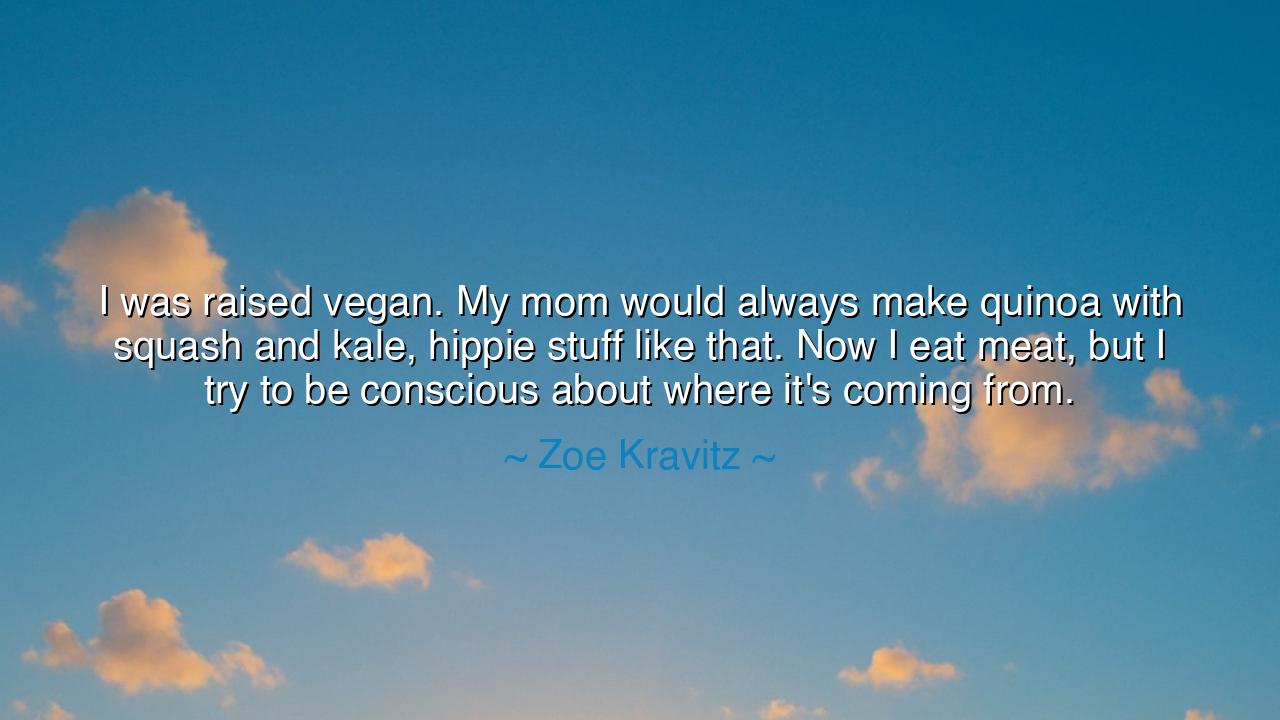
I was raised vegan. My mom would always make quinoa with squash
I was raised vegan. My mom would always make quinoa with squash and kale, hippie stuff like that. Now I eat meat, but I try to be conscious about where it's coming from.






The words of Zoë Kravitz, “I was raised vegan. My mom would always make quinoa with squash and kale, hippie stuff like that. Now I eat meat, but I try to be conscious about where it’s coming from,” at first seem lighthearted — a simple reflection on food and upbringing. Yet, beneath these words lies a deeper truth about heritage, awareness, and transformation. It is a meditation on how the lessons of one’s past shape the conscience of one’s present, and how the wisdom of our elders continues to guide us even as we evolve. What Zoë describes is not merely a change in diet, but a passage from inheritance to individuality, from following what is given to discerning what is right.
To be “raised vegan” is to be brought up with mindfulness — to live in awareness of the body, the earth, and the creatures that share it. Her mother, the radiant Lisa Bonet, was part of a generation that sought harmony with nature, a generation that rejected excess and embraced the simple, the pure, and the natural. When Zoë recalls the quinoa, the squash, and the kale — those humble foods of the earth — she is remembering more than meals. She is remembering the moral soil from which she grew: compassion, consciousness, and respect for life. Her mother’s “hippie stuff” was not a trend, but a philosophy — the ancient belief that what we take into our bodies becomes what we are, and that every choice carries spiritual weight.
The ancients, too, knew this truth. The philosophers of Greece and the sages of the East spoke of the balance between appetite and awareness. They taught that food is never merely sustenance — it is a covenant between the self and the world. To eat without thought is to live without reverence. But to eat with consciousness — as Zoë says she now strives to do — is to walk the middle path between indulgence and denial, between nature’s gifts and humanity’s responsibility. Her words echo the ancient virtue of moderation, the art of living not by extremes, but by understanding.
When Zoë says she now eats meat “but tries to be conscious about where it’s coming from,” she honors the spirit of her mother’s teachings while forging her own path. This is the essence of maturity: not rebellion, but integration. The ancients called this wisdom through discernment — the ability to evolve without forgetting one’s roots. She does not reject her upbringing; she refines it. She moves from blind adherence to conscious choice. This is how tradition lives — not by rigid repetition, but by renewal through understanding.
Consider the story of Siddhartha Gautama, the Buddha. In his youth, he practiced extreme fasting and asceticism, believing that holiness could be found through denial. But in time, he saw that both indulgence and deprivation were chains. Enlightenment, he discovered, lay in the Middle Way — the path of balance. Zoë’s reflection, though drawn from the modern world, carries this same ancient resonance. To eat consciously is to live consciously — to find the balance between gratitude and pleasure, between respect for the earth and enjoyment of its gifts.
Her words also remind us of the sacred relationship between parent and child. We inherit the values of our mothers and fathers not as burdens, but as torches — flames to carry forward, not cages to be trapped within. Zoë’s story is that of every child who grows, questions, and chooses anew. Her mother’s care shaped her; her choices now honor that care in a new form. This, too, is the way of the ancients: to build upon the wisdom of one’s forebears, to keep their truth alive through transformation.
And so, the lesson, my children of tomorrow, is this: live with awareness. Whether in what you eat, what you say, or what you consume from the world, let your choices be conscious. Do not scorn the ways of those who raised you, even if you walk a different path. Their wisdom is the foundation upon which your freedom stands. Remember that what sustains you — the food, the earth, the life around you — deserves gratitude, not exploitation. As Zoë Kravitz teaches through her simple remembrance, the act of eating can be an act of reverence, and every choice — from the plate to the heart — can be a reflection of care.
So eat with mindfulness, live with balance, and carry forward the sacred wisdom of those who taught you to see the world with love. For in the end, consciousness is the truest nourishment — and to live with awareness is to live in harmony with the eternal rhythm of life itself.






AAdministratorAdministrator
Welcome, honored guests. Please leave a comment, we will respond soon